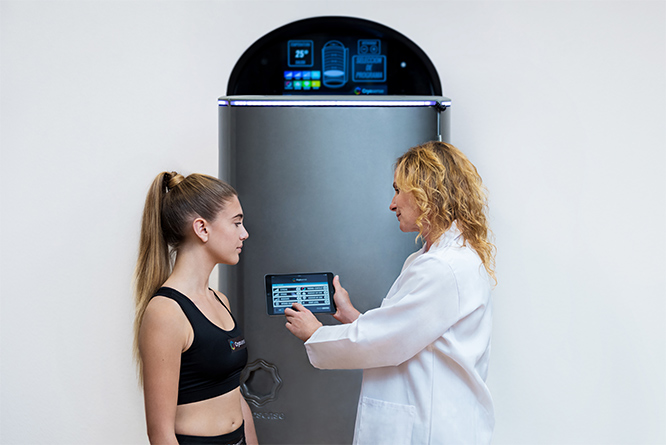From ice packs to water-immersion baths, therapeutic properties of extremely cold temperatures have always been a matter of interest.
Whole-body cryotherapy (WBC), a revolutionary version of this modality, has only recently started to draw attention because of the remarkable impact it proves to have on health and wellbeing.
This article will cover all the potential benefits of cryotherapy and help you find out just what it is that makes this 3-minute cooling chamber treatment so therapeutic.

Whole-body cryotherapy – what you need to know
What is cryotherapy?
Cryotherapy essentially means ‘cold therapy’, extending to any type of body cooling for therapeutic purposes.
Whole-body cryotherapy nowadays refers to a medical physical treatment done in the so-called cryo chambers or cryosaunas which come in two forms.
The more popular version is delivered with the person standing in the chamber with the torso being exposed to hyper-cool air or gas, while the head stays out in room temperature. The second version resembles more of a sauna, where one or more individuals sit in a chamber which is then filled with cold air.
How does it work?
There are various proposals as to why extreme body cooling is so beneficial, the most compelling being related to pain numbing.
Extreme temperature changes “shock” the pain receptors, causing temporary relief and soothing. When the pain is blocked, the impulses causing muscle spasms and cramps are broken, relaxing the affected areas.
Another idea is that the deceiving effect of freezing triggers the brain’s emergency mode, improving blood flow and boosting adrenaline. Your core starts heating the blood intensely to bring the warmth back to the extremities, thus improving circulation and awakening the body’s natural healing mechanisms.
The resulting power of dry air or gas (depending on the cooling system: electric or nitrogen) is mostly used for athletes and in sports medicine for alleviating muscle pain and soreness, reducing injury-induced inflammation, eliminating muscle stiffness, or simply for recovery after exercise.
What to expect from a typical treatment?
Humidity and temperature-controlled chambers are brought to -110 °C to -140 °C, however, due to the brief exposure (between 1.5 and 3 minutes maximum) and body warmth, the skin is cooled to a bearable – 35 °C. Since the air is free of moisture, the subject feels a chill breeze but not the uncomfortable cold stinging.
Before entering the cryo chamber, you must go through a -60 °C vestibule for at least 30 °C to prepare and slowly adapt the body. The subjects should be fully unclothed (or at least in their underwear) and meticulously dried from sweat and moisture to prevent frostbite injuries. That’s also why the extremities are protected with gloves, slippers and socks.
The chamber time mustn’t extend 3 minutes, so the whole process takes less than 15 minutes total.
Although there are expensive home-use versions of cryotherapy, cryosaunas are still most safely distributed in medical treatment salons, with trained professionals and in highly controlled conditions.
Benefits of cryotherapy
What started as an anti-inflammatory treatment in sports medicine has now found its clients in basically anyone who is in need of a quick and relaxing self-time.
In fact, research continues to back up the positive outcomes of cryotherapy fighting muscle tenderness, stiffness, joint pain, injury and even improving mental health.
Some of the most notable benefits include:
- Treating muscle damage
- Reducing muscle inflammation and tenderness
- Improving circulation
- Muscle and tissue recovery after exercise
- Improved cortisol levels for better athletic performance and recovery
- Positive impact of mood swings, anxiety and depressive disorders
- Relieving effect on arthritis and other inflammatory rheumatic diseases
A pre-exercise cryotherapy session proved to effectively fight muscle soreness and inflammation by controlling the secretion of proinflammatory signalling molecules that can cause swelling, tenderness, and loss of muscle strength 5-7 days post exercising.
Interesting discoveries have also shown that WBC can have a positive effect on mental health, combating anxiety and mood disorders due to the relaxing and pain-alleviating powers.
One study demonstrated that patients suffering from rheumatoid arthritis can benefit from regular WBC. It proved to significantly reduce joint stiffness and diminish the severity of dull morning pain.
Exercise-induced injury and joint dislocation can affect the quality of life, not only for athletes but also cause chronic pain and limited lifestyle quality for anyone with the issue. Although still a more expensive option, WBC is slowly being introduced to injury rehabilitation as a quick and fruitful treatment with few or no side effects.
Conclusion
The power of cold therapy is yet to be discovered. For now, whole-body cryotherapy chambers offer solutions not only for athletes in professional preparation but also to anyone looking for a non-invasive, natural way of injury prevention and overall boosted muscle quality and strength.
That said, to be on the safe side, it’s best to consult a physician or a professional before embarking on a WBC journey, to make sure it is safe for your current health condition.
